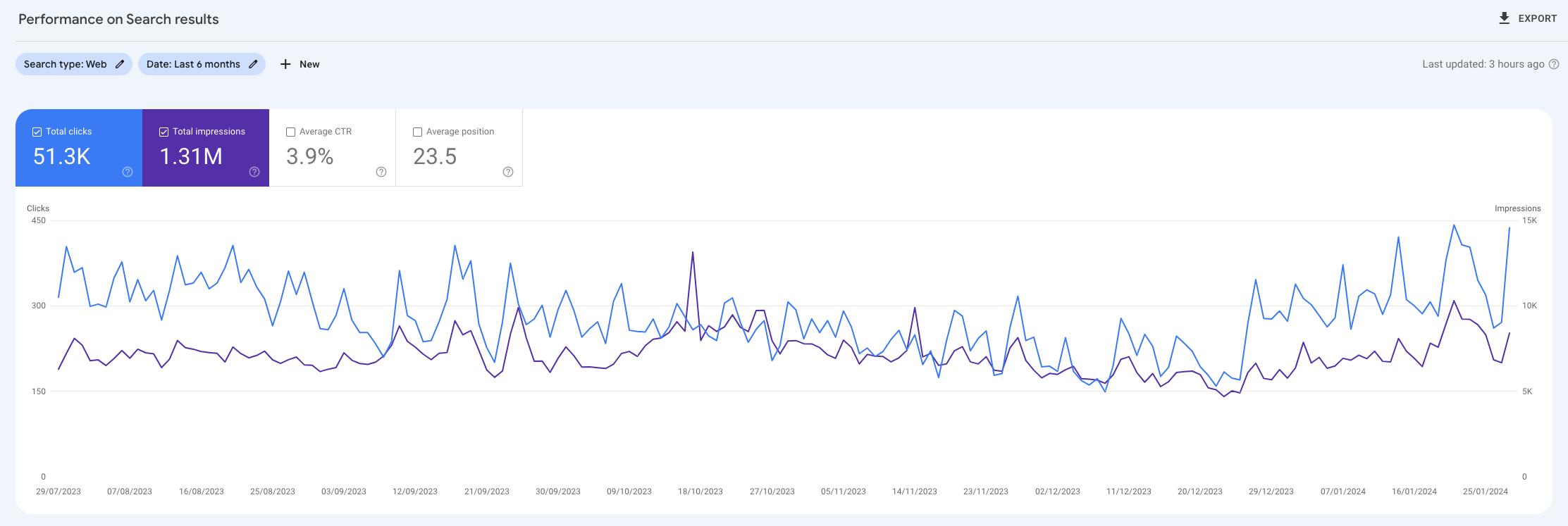
How to implement an effective SEO strategy to grow your business
Understanding how to implement an effective SEO strategy remains a huge factor in driving business growth. It’s crucial for businesses, especially those aspiring to grow online, to align their SEO efforts with the latest trends and techniques. Let’s look at the essential steps you need to know to develop and execute a successful SEO strategy that can propel your business to new heights.
Introduction to SEO
Continuous updates in search engine algorithms and user behaviour patterns means you need to ensure you’re on top of what’s relevant in the space. Staying ahead of these changes is crucial for businesses to maintain their online visibility and attract their target audience effectively.
Why is this important for businesses?
SEO is not just a nice-to-have anymore, but essential for online business growth. It enhances online visibility, drives targeted traffic, and increases the potential for conversions, ultimately contributing to the bottom line. Not understanding the basics, or having the space to work with an expert can put your business behind and cost you ££££.
Understanding your target audience
Identifying customer personas
The first step in any successful SEO strategy is understanding who your customers are. Creating detailed customer personas helps tailor your SEO efforts to meet the specific needs and preferences of your target audience.
Analysing search intent
Understanding the intent behind the searches your potential customers make is crucial. This knowledge allows you to optimise your content and website to answer their queries effectively, thereby improving your search engine rankings. Your content needs to be relevant to what your business is, what you do as a business and what you have to offer.
Keyword research.. the foundation
Tools and techniques
Employing the right tools and techniques for keyword research is absolutely fundamental. Tools like Google Keyword Planner and SEMrush offer insights into keyword relevance, competition, and search volume, guiding your content strategy. Without these, you’ll never truly understand where your website is positioned and what opportunities you have for growth.
Understanding long-tail keywords
Long-tail keywords, being more specific and less competitive, can significantly improve your chances of ranking higher in search results. They also align well with the natural language processing capabilities of modern search engines.
Long-tail keywords are phrases that are more specific and usually longer than typical keywords. While a standard keyword might be something broad like “SEO,” a long-tail version could be “how to implement an SEO strategy for small businesses in 2024.” These keywords are less common and often have lower search volumes, but they hold significant value for several reasons.
On-page SEO essentials
On-page SEO involves optimising individual web pages to rank higher in search engines. By refining elements like titles, headings, content, and meta descriptions, you make it easier for search engines to understand and index your pages, potentially leading to higher rankings.
Optimise your meta tags and descriptions
Meta tags and descriptions play another key role in your SEO strategy. This is on-page SEO. They provide search engines with a synopsis of your webpage, impacting your click-through rates from search engine results pages (SERPs).
Effective on-page SEO improves the user experience. A well-structured page with clear headings, relevant and engaging content, and fast load times keeps users engaged and reduces bounce rates. Search engines favour sites that provide a good user experience.
Content quality and relevance
The fundamental aspect of SEO is high-quality, relevant content to your business, products, services and who you are as a whole. It should provide value to your readers, answer their queries, and be regularly updated to remain relevant.
Search engines aim to provide users with the most relevant results for their queries, and by optimising your content, you increase the chances of it ranking well for targeted keywords.
Why you should focus on local SEO
Importance for small businesses
Local SEO is a game-changer for small and local businesses. It helps in targeting customers in your vicinity, increasing the likelihood of attracting foot traffic to brick-and-mortar stores.
Effective local SEO can give you an edge over competitors who are not as optimised for local search. By appearing higher in local search results, you’re more likely to attract local customers.
Local SEO strategies you can implement today
Effective local SEO strategies include optimising for local keywords, claiming your Google My Business listing, and garnering positive reviews from local customers.
Local SEO helps your business appear in local search queries relevant to your products or services. For example, if someone searches for “best coffee shop near me” and you own a coffee shop, effective local SEO can help your business appear in these search results.
Everyone is on mobile, you should be too
Mobile-first indexing
With the increasing predominance of mobile devices, search engines prioritise mobile-friendly websites. Ensuring your website is optimised for mobile is no longer optional but imperative.
Mobile optimisation involves improving the load speed of your pages on mobile devices. Page load speed is a key ranking factor for search engines, as faster websites provide a better user experience.
Enhancing user experience on mobile
A website should always offer an excellent user experience, with fast loading times, easy navigation, and readable content on smaller screens.
Websites typically see higher engagement (longer visit durations, more pages per session) and conversion rates (more inquiries, sign-ups, purchases) if they’re well optimised for mobile. Search engines recognise these positive user behaviour signals and may reward these sites with higher rankings.
Mastering off-page
Building quality backlinks
Backlinks are a critical component of off-page SEO. Earning high-quality backlinks from reputable websites not only boosts your website’s authority but also drives referral traffic.
Off-page SEO activities like acquiring backlinks from reputable websites help in building your site’s domain authority. A higher domain authority indicates to search engines that your website is credible, trustworthy, and relevant, which can boost your rankings in search results.
By improving off-page SEO, you can increase your website’s visibility and organic search traffic. When other websites link to your content, it not only drives direct traffic from those sites but also enhances your visibility in search engine results pages (SERPs).
Social media integration
While social media signals are not a direct ranking factor, they influence your SEO indirectly. A strong social media presence can enhance brand recognition and lead to more organic search traffic.
While the direct impact of social signals (likes, shares, comments) on SEO rankings is debatable, they do contribute to broader visibility and traffic. Content that performs well on social media can attract more backlinks and online mentions, indirectly benefiting your SEO efforts.
What is technical SEO?
Technical SEO optimises your website for the crawling and indexing phase. Search engines use bots to crawl websites; technical SEO ensures that these bots can effectively find and index your web pages. Without proper crawling and indexing, your site might not appear in search results at all.
Website speed and performance
The speed and performance of your website have a direct impact on user experience and SEO. Faster websites are favoured by search engines and reduce bounce rates.
Page speed is a critical ranking factor. Technical SEO tactics are used to improve loading times for web pages, which not only boosts SEO but also enhances user experience, leading to lower bounce rates and higher engagement.
Structured data and schema markup
Implementing structured data and schema markup helps search engines understand the content of your website better, potentially leading to richer search results with higher click-through rates.
Effective site structure and navigation help users and search engines find content more efficiently. Technical SEO ensures that your website has a logical hierarchy, clean URLs, and effective navigation, all of which improve user engagement and search ranking.
Content marketing and your SEO strategy
Create valuable content
Content marketing and SEO go hand in hand. Creating valuable, informative, and engaging content not only satisfies your audience but also helps in building your website’s authority and ranking.
Quality content allows you to incorporate relevant keywords naturally. This helps search engines understand what your site is about, increasing the chances of ranking for those terms. Varied and comprehensive content also enables you to target a broader range of long-tail keywords, which are less competitive and often have higher conversion rates.
Use your content to drive traffic
Quality content is a magnet for traffic. By addressing the needs and questions of your target audience, your content can attract and retain visitors, ultimately converting them into customers.
Search engines favour websites that provide valuable, high-quality content. Regularly publishing relevant and informative content can improve your site’s rankings in search results. It signals to search engines that your site is a valuable resource, leading to higher visibility.
By ranking higher in search results and addressing the needs and questions of your target audience, good content attracts organic traffic. Users searching for information or solutions that your content provides are more likely to visit your site.
Implementing social media
Active social media presence helps in building brand awareness. When more people are aware of your brand and engaging with your content on social media, it can indirectly influence your search engine rankings through increased search demand and brand recognition.
Social signals
Social signals, such as shares and likes, can indirectly impact your SEO. They increase your content’s reach, potentially leading to more backlinks and higher traffic.
Social media platforms are excellent channels for distributing and amplifying your content. By sharing your content on social media, you increase its visibility and reach, leading to more traffic to your website.
The more your content is shared on social media, the higher the likelihood of it being seen and linked to by other website owners. Backlinks are a crucial SEO ranking factor, and social media can facilitate the natural acquisition of these links.
Engage with your audience
Regular engagement with your audience on social media not only builds brand loyalty but also encourages your followers to visit your website, increasing your organic traffic.
Social media encourages more direct and immediate engagement with your audience. This engagement, whether through comments, likes, or shares, can signal to search engines that your content is valuable and relevant, thereby influencing your SEO.
How to track and analyse SEO performance
Key performance indicators (KPIs)
Tracking the right KPIs is crucial to measure the success of your SEO strategy. These include organic traffic, search rankings, bounce rate, and conversion rate, among others.
Implementing analytics tools
Tools like Google Analytics provide invaluable insights into your website’s performance, helping you understand user behaviour and tweak your SEO strategy for better results. This is a fundamental tool for tracking website traffic and user behavior. Google Analytics provides insights into how visitors find your website (organic search, direct, social, referrals), what they do on your site, bounce rates, session duration, and conversions. This data helps in understanding the effectiveness of your SEO strategies in driving traffic and engagement.
Google Search Console helps track your website’s performance in Google Search. It provides data on search queries that lead users to your site, the average position of your site in search results, click-through rates (CTR), and the indexing status of your pages. It’s also useful for identifying crawl errors and security issues.
Tools like Google’s PageSpeed Insights or GTmetrix provide insights into how fast your web pages load. Since page speed is a ranking factor, monitoring and improving load times is crucial for SEO.
Conversion tracking
In Google Analytics, set up goals to track conversions. Conversions can be form submissions, product purchases, sign-ups, or any other key action you want users to take. Tracking conversions helps in understanding the ROI of your SEO efforts.
For a more comprehensive view, you can use tools like Google Data Studio to create custom dashboards that combine data from various sources (like Google Analytics, Google Search Console, and social media analytics) for more holistic SEO performance tracking.
Common SEO Mistakes to Avoid
Black hat techniques
Steering clear of black hat SEO techniques is essential. While these may offer short-term gains, they can lead to long-term penalties and damage your website’s credibility.
Ignoring user experience
User experience is a significant factor in SEO. Websites that are user-friendly, easy to navigate, and provide valuable content are more likely to retain visitors and rank higher in search results.
Slow-loading pages lead to a poor user experience and can negatively impact your search engine rankings. Regularly test and optimise your website’s load time.
Adapting to algorithm changes
Staying updated
SEO is not a set-it-and-forget-it strategy. It requires continuous adaptation to the frequent changes in search engine algorithms to maintain and improve your website’s visibility.
Keep an agile mindset with your SEO strategy
Developing agile SEO strategies allows businesses to quickly respond to algorithm updates, ensuring their SEO efforts remain effective and their website stays competitive.
Future-proof your SEO strategy
Voice search optimisation
With the rise of voice search, optimizing for conversational queries and natural language is becoming increasingly important for SEO.
AI and machine learning in SEO
Embracing AI and machine learning technologies can provide advanced insights into SEO strategies, helping in predictive analysis and personalised content creation.
Poor use of AI can also have a negative impact on your website’s SEO. By simply “copy and pasting” basic articles written wholefully by AI can sometimes prove irrelevant to your website. If you’re implementing the use of AI into your SEO strategy you need to be ensuring that your content is providing real value.
Implementing an SEO Strategy in your business
Step-by-step implementation
A structured approach to implementing an SEO strategy can significantly enhance its effectiveness.
We provide a step-by-step implementation guide for those of you who are keen to get stuck in and start growing your business. Book a discovery call here today and we’ll walk you through how that works.
Tailor your SEO for your business
Each business is unique, and so should be its SEO strategy. Tailoring your SEO efforts to align with your business goals and audience preferences is crucial for success.
FAQs on SEO Strategy Implementation
Here, we answer some of the most frequently asked questions about implementing an SEO strategy, providing expert insights and practical advice.
What are the first steps in developing an effective SEO strategy?
The initial steps include:
- Audience Analysis: Understanding your target audience’s interests, behaviours, and search patterns is crucial. This involves researching the demographics, preferences, and problems your audience faces.
- Keyword Research: Identify keywords and phrases your target audience uses in their searches. Tools like Google Keyword Planner and SEMrush can help you find relevant keywords, including long-tail phrases.
- Website SEO Audit: Evaluate your current website for SEO performance. This includes checking the website’s structure, content quality, mobile-friendliness, page loading speed, and existing backlink profile.
How important is keyword research in SEO?
Keyword research is fundamental to SEO because:
- It helps you understand the language your potential customers use when searching for your products or services.
- Enables you to create content that aligns with user intent, increasing the likelihood of attracting and engaging your target audience.
- Influences how you optimise various elements of your website – from meta tags to content – making it more likely for search engines to rank your site for relevant queries.
Can small businesses compete with large companies with SEO?
Absolutely, small businesses can effectively compete by:
- Focusing on niche keywords where competition might be lower.
- Leveraging local SEO techniques, such as optimising for local search queries and maintaining an up-to-date Google My Business profile.
- Creating unique, high-quality content that addresses specific needs or questions of their target audience, which large companies might overlook.
How do I optimise my website for mobile devices?
When optimising your website for mobile devices, you should:
- Implement a responsive web design that automatically adjusts the layout to fit various screen sizes.
- Improve page loading speed by optimising images, leveraging browser caching, and minimizing code.
- Simplify website navigation for ease of use on mobile devices and ensure text is easily readable without needing to zoom in.
What role does content play in SEO?
Content is central to SEO for several reasons:
- Quality content engages users, encouraging them to spend more time on your site, which can positively impact search rankings.
- Regularly updated, relevant content signals to search engines that your website is current and offers value to users.
- Content optimised with targeted keywords helps search engines understand and rank your pages for relevant searches.
How do backlinks effect my SEO strategy?
Backlinks are vital because:
- They act as endorsements from other websites, signalling to search engines that your content is valuable and authoritative.
- High-quality backlinks, especially from sites with high domain authority, significantly boost your site’s credibility and search rankings.
- Instead of focusing on quantity, aim for high-quality backlinks through natural, organic outreach such as guest blogging, collaborations, and creating shareable content.
Implementing a comprehensive SEO strategy is integral to the growth and success of any business in 2024. This guide has covered the crucial aspects of SEO, from keyword research to content marketing, technical SEO, and performance tracking.
Immediate steps for businesses
To start reaping the benefits of SEO, businesses should take immediate steps, such as conducting thorough keyword research, optimising their website for mobile, and focusing on creating high-quality content. These initial steps can set the foundation for a robust and successful SEO strategy.
If you want to know how well your website’s SEO performance is doing, or want to get ahead with a comprehensive SEO strategy – Click here to book a discovery call – We’ll dive deep into your current SEO and give you some valuable insights to take away or to work with us to implement and get ahead in 2024!

